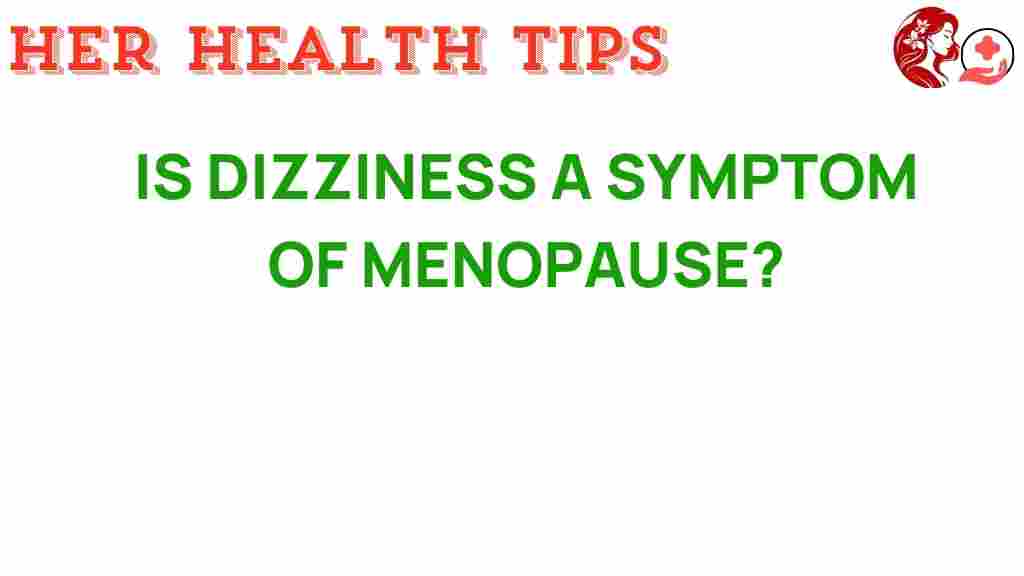Dizziness: A Hidden Symptom of Menopause?
Dizziness is often an overlooked symptom in women’s health discussions, particularly concerning menopause. As women approach middle age, they undergo various hormonal changes that can significantly impact their physical and emotional well-being. In this comprehensive article, we will explore how dizziness can manifest as a hidden symptom of menopause, its underlying causes, and what steps you can take to manage it effectively.
Understanding Menopause and Its Symptoms
Menopause marks a significant transition in a woman’s life, typically occurring between the ages of 45 and 55. This natural biological process signifies the end of menstrual cycles and reproductive capability, resulting from a decline in the production of hormones such as estrogen and progesterone.
Common symptoms of menopause include:
- Hot flashes
- Night sweats
- Mood swings
- Vaginal dryness
- Sleep disturbances
- Weight gain
However, dizziness is less frequently discussed, yet it can be a distressing experience for many women during this transition. Understanding the connection between dizziness and menopause is crucial for awareness and effective management.
How Hormonal Changes Trigger Dizziness
The relationship between hormonal changes and dizziness is complex. Here are several ways these fluctuations can contribute to feelings of lightheadedness or imbalance:
- Estrogen Levels: Estrogen plays a vital role in regulating the body’s balance system. A significant drop in estrogen during menopause can affect neurotransmitters and blood flow, leading to dizziness.
- Blood Pressure Variations: Hormonal changes can also lead to fluctuations in blood pressure. Low blood pressure can cause dizziness, particularly when standing up quickly.
- Vestibular System Changes: The vestibular system, responsible for balance, may be impacted by hormonal shifts, causing coordination issues and dizziness.
- Stress and Anxiety: Menopause can bring emotional challenges. Increased anxiety and stress can lead to hyperventilation or panic attacks, which often manifest as dizziness.
Recognizing these factors is essential for understanding why dizziness can be a hidden symptom of menopause.
Identifying Dizziness During Menopause
Women experiencing dizziness during menopause often report it in various forms, including:
- Lightheadedness
- Spinning sensation (vertigo)
- Feeling faint or weak
- Balance issues
To effectively manage dizziness, it is vital to identify its specific characteristics:
- Duration: How long does the dizziness last? Is it a brief episode or a prolonged sensation?
- Triggers: Are there specific situations or activities that provoke dizziness?
- Associated Symptoms: Is dizziness accompanied by other symptoms like headaches, nausea, or visual disturbances?
Keeping a symptom diary can be beneficial in identifying patterns and triggers, which can be shared with your healthcare provider for further evaluation.
Step-by-Step Process to Address Dizziness
If you are experiencing dizziness during menopause, consider following this structured approach to address the issue:
1. Consult Your Healthcare Provider
The first step in addressing dizziness is to consult with your healthcare provider. They can help determine whether your dizziness is related to menopause or if another underlying condition may be present.
2. Conduct a Comprehensive Assessment
Your healthcare provider may perform a thorough assessment, including:
- Medical history review
- Physical examination
- Blood tests to check hormone levels
- Balance tests or referrals to specialists if needed
3. Lifestyle Modifications
Incorporating lifestyle changes can help manage dizziness effectively:
- Stay Hydrated: Dehydration can exacerbate dizziness. Ensure you drink plenty of water throughout the day.
- Balanced Diet: A well-balanced diet rich in fruits, vegetables, whole grains, and lean proteins can support overall health.
- Regular Exercise: Engaging in physical activity can improve circulation and stability, reducing dizziness.
- Avoid Caffeine and Alcohol: These substances can contribute to dehydration and exacerbate dizziness.
4. Stress Management Techniques
Since stress and anxiety can contribute to dizziness, consider incorporating stress management techniques into your routine:
- Mindfulness meditation
- Yoga or tai chi
- Deep breathing exercises
5. Hormonal Treatments
If dizziness persists and is significantly impacting your quality of life, discuss hormonal treatments with your healthcare provider. Hormone replacement therapy (HRT) may help alleviate various menopausal symptoms, including dizziness.
Troubleshooting Tips for Managing Dizziness
Here are some practical tips to manage dizziness effectively, especially during menopause:
- Take Your Time: When standing up, do so slowly to prevent sudden drops in blood pressure.
- Focus on Your Breathing: If you feel anxious, practice deep, slow breaths to help calm yourself.
- Limit Sudden Movements: Avoid quick head movements which can trigger dizziness.
- Use Support: If you feel unsteady, use furniture or walls for support when walking.
Incorporating these tips into your daily routine can help you navigate dizziness during menopause more effectively.
Conclusion: Embracing Wellness in Menopause
Dizziness is indeed a potential hidden symptom of menopause, often overshadowed by more prominent symptoms. By understanding the connection between hormonal changes and dizziness, you can take proactive steps to manage your symptoms and enhance your overall wellness.
Awareness is key—recognizing the signs of dizziness and understanding their relationship with menopause can empower women to seek the necessary support from healthcare providers. The aging process does not have to diminish your quality of life; instead, it can be an opportunity to embrace wellness and take charge of your health journey.
For more information on women’s health and menopause-related resources, consider visiting this site.
If you or someone you know is struggling with dizziness or other menopause symptoms, don’t hesitate to reach out to a healthcare professional for guidance and support.
This article is in the category Reproductive and created by HerHealthTips Team
